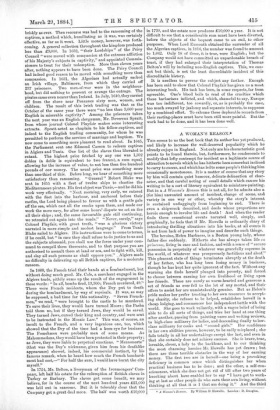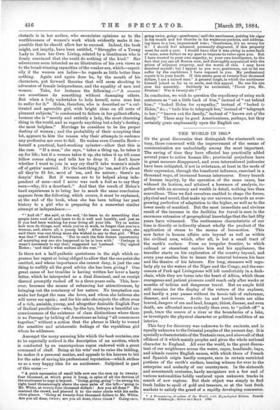A WOMAN'S REASON.*
Tins seems to us the best book that its author has yet produced, and likely to increase the well-deserved popularity which he already enjoys in England. Not only are his characteristic good points to be found therein, but, furthermore, he condescends to. modify that lofty contempt for incident as a legitimate source of attraction to novels which he has hitherto been somewhat inclined to carry to excess, and which has led to some people's thinking him occasionally monotonous. It is a matter of course that any story by him will contain quiet humour, delicate delineation of char- acter, and that careful noting of small details which causes his writing to be a sort of literary equivalent to miniature-painting- But in a A Tircnnan's Beason this is not all, for he admits also a (for him) unwonted amount of incident, change of scene, and variety in one way or other, whereby the story's interest is sustained unflaggingly from beginning to end. There is even a shipwreck described, and deeds whose proportions are heroic enough to involve life and death ! And when the reader finds these sensational events narrated well, simply, and graphically, he feels that if Mr. Howells is ordinarily chary of introducing thrilling situations into his books, at all events it is not from lack of power to imagine and describe such things.
The heroine, Helen Harkness, is a Boston young lady, whose father dies suddenly. Hitherto she has always taken life en princesse, living in ease and fashion, and with a sense of "secure possession in perpetuity of whatever was gracefully supreme in the world, of whatever was prosperously fastidious and aloof." This pleasant state of things terminates abruptly at the death of her father, who has long been losing money in business, though he has kept her quite ignorant of the fact. Without any warning she finds herself plunged into poverty, and forced, to choose between earning her own livelihood or living upon her friends. These are surely as warm-hearted and generous a set of friends as ever fell to the lot of any mortal, and their offers to assist her are unmistakeably genuine. But as Helen's pride makes her prefer trusting to her own resources to accept- ing charity, she refuses to be helped, establishes herself in a cheap lodging, and commences her independent battle with the world. She goes to work valiantly, with a vague belief of being able to do all sorts of things, and tries her hand at one thing after another, passing from painting vases and writing reviews, to high-class millinery for ladies, and descending finally to low- class millinery for cooks and "second girls." Her confidence in her own abilities proves, however, to be sadly misplaced ; she fails totally in all her undertakings except the last, and even in that she certainly does not achieve success. She is brave, true, loveable, clever, a lady to the backbone, and to our thinking the most charming heroine Mr. Howells has yet drawn ; but there are three terrible obstacles in the way of her earning money. The first two are in herself—one being a provoking deficiency in common sense which distinguishes her when practical business has to be done ; and the other, a self-con- sciousness, which she does not get rid of till after two years of knocking about have enabled her to say "I have got to work- ing at last as other people do who earn their own living, without thinking at all that it is I that am doing it." And the third • A Woman's Beaton. By William D. Howells. London : D. Douglas.
'obstacle is in her author, who enunciates opinions as to the worthlessness of women's work which evidently make it im-
possible that he should allow her to succeed. Indeed, the book 'night, not inaptly, have been entitled, "Struggles of a Young
Lady to Earn her Own Living, related by a Gentleman who is firmly convinced that she could do nothing of the kind." Her adventures seem intended as an illustration of his own views as to the bread-winning capacities of the weaker sex, which—especi- ally if the women are ladies—be regards as little better than nothing. Again and again does he, by the mouth of his characters, put forward theories that will seem shocking to advocates of female independence, and the equality of men and
women. Take, for instance the following :—" A woman can sometimes do something without damaging others. But when a lady undertakes to help herself, some man has to suffer for it." Helen, therefore, who is described as "a cul-
tivated and agreeable girl, with bright ideas on all sorts of pleasant subjects," is condemned to failure in her gallant efforts, because she is "merely and entirely a lady, the most charming • i thing n the world, and as regards anything but a lady's destiny, the most helpless." Marriage he considers to be the proper destiny of woman; and the probability of their accepting that
lot, appears to him the reason why their attempts to embrace any profession are sure to fail. He makes even Cornelia Root—
herself a practical, hard-working spinster—allow that this is the case. "If a man," she says, "takes a thing up, he takes it ap for life ; but if a woman takes it up, she takes it up till some fellow comes along and tells her to drop it. I don't know whether I want to join in any cry that'll take women's minds 'off of gettin' married. It's the best thing/or 'em, and it's about all they're fit for, most of 'em, and its nature ; there's no " ' And oh !' she said, at the end, do learn to do something that people have need of, and learn to do it well and humbly, and just as if you had been working for your living all your life. Try to notice how men do things, and, when you're at work, to forget that you're a woman, and, above all, a young lady.' After she came away, she said there was one thing more she wished to say to that girl. What was that ?' asked Fenton. Not to omit the first decent opportunity of marrying any one she happened to be in love with.' 'Perhaps it wasn't necessary to say that,' suggested her husband. 'No,' sighed Helen ; and that's what undoes all the rest." Is there not a half-pathetic quaintness in the sigh which ex- presses her regret at being obliged to allow that the one point she omitted, and whose importance she cannot deny, is just the one thing to nullify all the good advice she has been giving? One great cause of her troubles is having written her lover a hasty letter, which he interpreted as a final dismissal, and on receipt thereof promptly rushed off to a three-years exile. This, how- .ever, becomes the means of enhancing her attractiveness, by bringing out the constancy of her nature. No temptation can make her forget the man she loves, and whom she believes she will never see again ; and for his sake she rejects the offers even of a rich, amiable, young, and altogether desirable English Peer of Radical proclivities—who, by-the-bye, betrays a beautiful un- consciousness of the existence of class distinctions where there is no Peerage by talking of Americans as being "all commoners together," without a notion that the phrase is likely to wound the sensitive and aristocratic feelings of the republican girl whom he addresses. Amongst the many amusing bite which the book contains, one to be especially noticed is the description of an auction, which is conducted by an unscrupulous rogue endowed with a great -command of chaff. Being at his wits' end to raise the bidding, he makes it a personal matter, and appeals to his hearers to bid for the sake of saving his professional reputation—which strikes us as a very happy idea for an auctioneer. Subjoined is part .of this scene A quick succession of small bids now ran the sum up to twenty- four thousand, at which point it hung, in spite of all the devices of the auctioneer to urge it beyond. Going, going, going'—he swung his right hand threateningly above the open palm of the left= going to White, at twenty-four thousand dollars ! Are you all done ?' He scanned the crowd, and pierced it to the outer circle with his sada- clone glance. 'Going at twenty-four thousand dollars to Mr. White. Are yon all done, twice; are you all done, three times ? Going once, going twice, going—gentlemen,' said the auctioneer, putting his cigar in his mouth and his thumbs in his waistcoat-pockets, and address- ing them in a low, impassioned tone; - Gentlemen, it's no money for it ! I should feel ashamed, personally disgraced, if this property went for such a sum. I should know that it was owing to some fault of mine, some failure on my part to impress its value upon you. But I have trusted to your own sagacity, to your own intelligence, to the fact that you are all Boston men, and thoroughly acquainted with the prices of adjacent property, and the worth of this. 1 may have deceived myself; but I appeal to you now, gentlemen, not to let me suffer by the confidence I have reposed in you. My professional repute is in your hands. If this estate goes at twenty-four thousand dollars, I am a ruined man.' A general laugh, in which the auctioneer himself joined so far as to smile, met this appeal. He ran his eye over the assembly. Suddenly he exclaimed, Thank you, Mr. Everton ! Was it twenty-six ?' " In conclusion, we wish to question the expediency of using such sentences as "sat a little back of him," instead of "sat behind him ;" "looked Helen for sympathy," instead of "looked to Helen," &c. ; "bade him to telegraph her," instead of "telegraph to her;" "known out the family," instead of "known out of the family." These may be good Americanisms, perhaps, but they certainly grate unpleasantly upon the English ear.



































 Previous page
Previous page